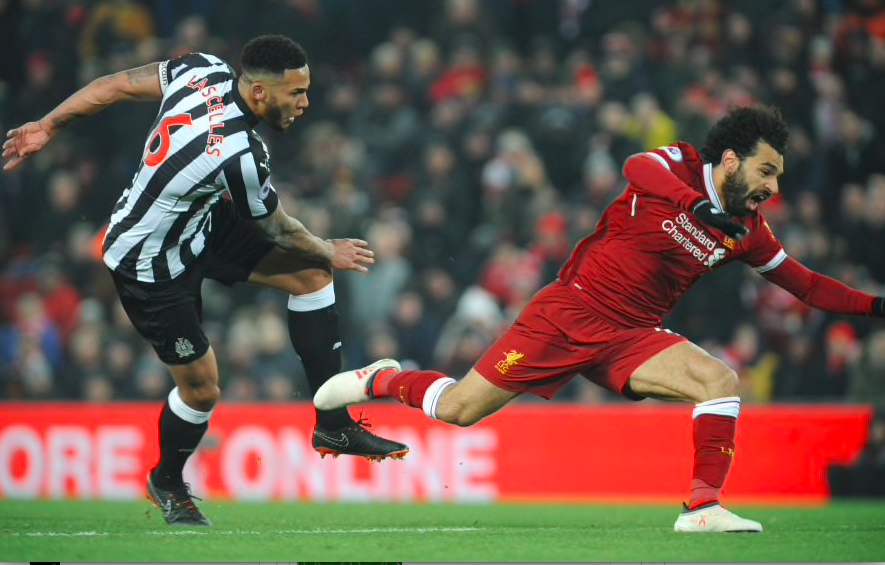
Okay, before I get onto the new evidence, which I feel shows two areas of officiating bias that are costing Liverpool dearly, a quick recap.
The other day I published a big piece of research that showed clear indications that Premier League referees, this season at least, prefer to award penalties to British players; and that, with just 41.5% of the league’s players coming from the British Isles (Britain + Ireland), those very players accounted for 56.5% of the penalties won for fouls in the box (excluding handballs, a total of 62 penalties).
I made it clear that there seems no bias with regard to conceding penalties (British Isles players have conceded 40.9% of penalties this season, so spot-on, within half a percentage point, in terms of how you’d expect, all things being equal).
The discrepancy on winning penalties suggests to me that referees don’t take into account who makes the foul, but do look at foreign players and wave away their legitimate claims, perhaps due to a conscious or subconscious bias towards them diving – even though the most-punished divers of recent years are all Brits. (For the purpose of this article I will shorten British Isles-players to Brits.)
In the piece I also detailed a ton of decisions that have gone against Liverpool this season, which, despite some probable bias on my part, shows a high number of very clear fouls on Liverpool’s foreign players in the box that led to no penalty awards; but as soon as Adam Lallana stopped his run under contact against Everton in the FA Cup, a penalty was awarded by an English referee. Mo Salah can get kicked to high heaven, but Adam Lallana gets impeded and it’s a penalty. (This is not a slight on Lallana, just an observation.)
Indeed, it seems that it’s okay to rough up a player like Salah, because he’s foreign. While I wouldn’t say he’s been subject to many dangerous fouls, he has been held, blocked, pulled, tripped and tackled from behind, all in the box, and nothing has been given. Ditto Sadio Mané.
In the last 24 hours I have examined some further figures, and actually found more evidence to back up these claims regarding Brit-players being favoured by referees, with some worrying conclusions to be drawn.
In addition, I have long-since suspected (and claimed on this site) that English refs don’t like giving Liverpool penalties at Anfield, and there is now stark statistical evidence that backs this up. (This is in addition to my discovery late last year that referees in Europe award Liverpool a penalty four times as frequently as those in the Premier League do.)
So this is a shorter piece than Tuesday’s, with not quite as much detail; a kind of addendum to the first piece. You don’t need to read it, but it may help.
As I noted the other day, British players win almost 60% of penalties (this season at least), when they comprise just over 40% of the playing pool. But go back historically, and there appears to be a trend of some serious shit that will count against Jürgen Klopp and his players.
Liverpool Win More Penalties When the Team and the Manager is British
Yup, and it’s not even close.
In 2013/14 Liverpool won an astonishing 12 penalties, with five won by Luis Suarez. However, as two were handballs, I will refer to my rule from the previous article and exclude those, as a) they are no longer really given as penalties (just four all this season, or 6% of all penalties), and b) they are not necessarily “won” by a player (although Suarez sneakily won his by lifting the ball onto the opposition player’s arm – or close enough to it so that the arm went out instinctively – from close range. Now you can virtually punch the ball clear and get away with it.)
So, that makes 10 penalties won by fouls in 2013/14. TTT’s Andrew Fanko (who does the summer Should They Stay Or Should They Go? series) noted on Tuesday that the other seven were won by Steven Gerrard, Daniel Sturridge, Raheem Sterling and Joe Allen. So, 70% of Liverpool’s penalties were won by Brits. As Andrew notes:
• Palace (H) won by Sterling
• Newcastle (A) won by Suárez
• Stoke (A) won by Sterling
• Villa (H) won by Suárez
• Everton (H) won by Sterling (missed by Sturridge)
• Fulham (A) won by Sturridge
• Soton (A) won by Suárez
• Utd (A) handball, but effectively won by Suárez
• Utd (A) won by Allen
• Utd (A) won by Sturridge (missed by Gerrard)
• West Ham (A) handball, but effectively won by Suárez
• West Ham (A) won by….Flanagan!
Of course, it was a more British team back then, but it seems to back up the data-driven fact that Liverpool get more penalties when the team is more British. We can argue about correlation and causation, but the link in all the data I’ve studied is clear: this season, Brits win more penalties across the Premier League, and historically, Liverpool win more penalties when more British.
In most seasons – as you will see in the graphs lower down – Liverpool’s number of penalties almost always goes down when the team is more foreign, and goes up when the team is more British.
Now, for this I focused on only part of the team. Why? Well, almost all of the penalties won in the Premier League this season are won by forwards. Centre-backs, defensive full-backs and holding-midfielders are only likely to win them from corners, while goalkeepers won’t win them at all. So we have someone like Jamie Carragher, who made the side more British, with 3,000+ minutes most seasons, yet was never likely to win a penalty. Pepe Reina was a stalwart for years, making the team more foreign, yet he never won a penalty, obviously.
So, I went back through all of Liverpool’s seasons dating back to 2002* and, courtesy of Andrew Beasley’s help with the data, had a list of all Premier League minutes played by all players for Liverpool in each of the past 16 seasons. I stripped out, without prejudice, all goalkeepers, centre-backs and holding midfielders, and I also stripped out purely defensive full-backs (like Djimi Traore), leaving in attacking or semi-attacking full-backs (like Steve Finnan).
(* This was the date the list of penalty tables went back to on the resource I located.
But obviously the earlier Premier League years were mostly British players, before the late ’90s saw the start of a swing towards c.60% overseas players. I double-checked the penalties Liverpool received and it tallied, so the data seems trustworthy.)
This meant I looked only at strikers, wingers, attacking midfielders and the aforementioned full-back types; those likely to win over 90% of a team’s penalties in any given season. (Excluded, as deep midfielders, are Didi Hamann, Xabi Alonso, Javier Mascherano and, after 2011, Lucas Leiva, who became more of a ‘holder’ after injury. None of these players were likely to get into the opposition box much, even at corners.)
It left a range of between 4,049 and 16,087 minutes each season for the combined totals of Brits and Rest of Worlders. (Incidentally, both of the aforementioned figures – the highest and lowest – were for Brits. Liverpool were at their least British in 2008/09, when winning 86 points and finishing 2nd, and at their most British in 2012/13, when Brendan Rodgers took charge.)
I would have said that the bias stretches to foreign managers, but Gérard Houllier had a heavily-Brit side from 2002 (when this study commences) through to 2004, when he was sacked. Michael Owen then left for Real Madrid on a pre-Bosman, Emile Heskey was sold before Rafa Benítez arrived, and Danny Murphy was sold by the Spaniard. Of the non-defensive players, only Steven Gerrard remained a constant.
So, with the foreign manager, Houllier, and the Brit-heavy side, Liverpool won quite a lot of penalties between 2002 and 2004, despite finishing 5th and 4th, with relatively low points totals (65 and 60 respectively), and being pretty dull to watch. Yet on penalties, Liverpool ranked 3rd and 2nd, winning six and eight in those two seasons. (Harry Kewell joined the Reds in 2003, and he spent a small part of his youth career at Leeds, but I’ve kept him as an overseas player.)
So it seems the manager’s nationality is not such a key factor, with the difference being that Houllier inherited a very English side in 1998, with a local core, and in 2004 Benítez inherited a less-English side, and obviously (correctly) mined La Liga for Xabi Alonso and Luis Garcia, and then Pepe Reina, Fabio Aurelio, Alvara Arbeloa and Fernando Torres, all for excellent value for money. Benítez also bought Brits, but generally they were temporary solutions (Peter Crouch, Craig Bellamy) or underwhelming (Jermaine Pennant, a Champions League final aside, and Glen Johnson, after a bright start).
Likewise, after Brendan Rodgers’ heavily-Brit-based transfer activity (with more of the overseas buys from the time being due to the transfer committee), Jürgen Klopp has only signed two first-team Brits, in Alex Oxlade-Chamberlain and Andy Robertson (plus Dominic Solanke for the squad), although Klopp has been happy to use the better Brits he inherited. Klopp, like Benítez, has gone back to the country (his homeland) in which he won two league titles a few years earlier; Liverpool did not bring in Klopp for him to then ignore his German influence, just as Benítez was not expected to ignore Spain.
So anyway, Liverpool seem to win penalties not in relation to how good or exciting a side they are, but due to the quantity of Brits.
What I find fairly staggering is that Liverpool’s league position has always been higher than its penalty ranking in every single one of Benítez’s and Klopp’s seasons (bar last season, when Liverpool finished 4th and ranked 4th for the most PL penalties, but now it’s down to 8th in penalty rank, despite being in the top four).
By utterly stark contrast, Brendan Rodgers, Kenny Dalglish and Gérard Houllier always finished higher – every single season – in the penalty ranking than in the league table; even when the Reds finished 2nd under Rodgers, they finished top of the “penalties won” league. Obviously Rodgers and Dalglish were more likely to buy British players, as most managers feel most comfortable with compatriots, and also buying from the league they know best.
In Klopp’s first season (taking over Rodgers’ side around a quarter of the way in), and in Benítez’s last season, the Reds ranked in the bottom three for the number of penalties won. Which seems frankly ludicrous; although 2009/10 was Liverpool’s least British side since 2002, and 2015/16 was an even mix of Brits/RoWs.
You can see the patterns on the two double-axis graphs directly below. The number of penalties clearly rises and falls – almost eerily so – with the British minutes played, but the more foreign minutes, the greater the disparity.
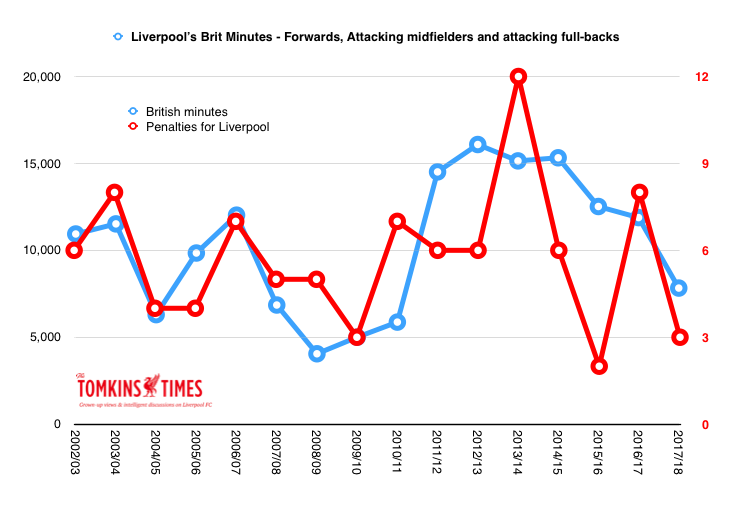
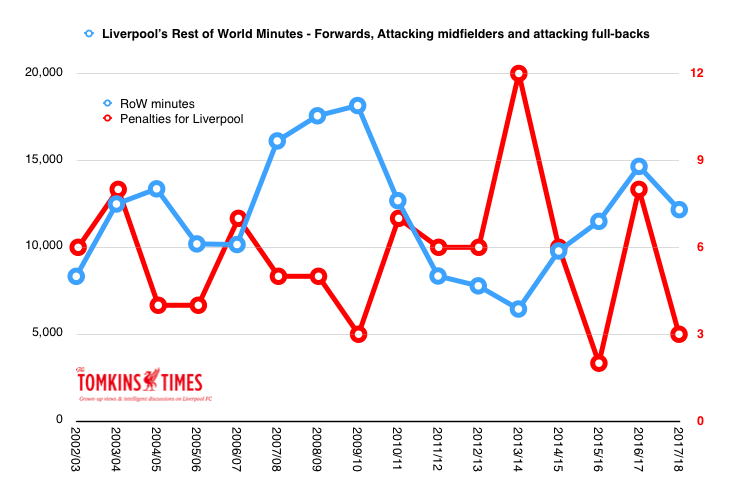
Liverpool’s best season for penalties (2013/14) falls during the Reds’ four “most-British” seasons.
Overall, Liverpool win an average of 5.2 penalties per season with more minutes played by RoW players, and 6.5 penalties per season when the greater number of minutes are by British players, although that includes a few seasons where there wasn’t much in it either way in terms of nationalities.
In the five seasons when Liverpool were “extremely” British the Reds won 36 penalties, an average of 7.2 penalties a season. In the six seasons when Liverpool have been “extremely” non-British, it’s just 27 penalties won, at an average of just 4.5 per season. This, despite the extremely overseas LFC finishing, on average, half a league place higher. So, if Liverpool are better but more foreign they will win fewer penalties than if inferior and British.
While 2013/14 plays a big part, the Reds appear to be worth almost three extra penalties a season if the side is largely British, compared with when largely foreign. How much of a swing could three penalties be? Even if it just won one extra game, that could push the Reds up a place in the table in tight seasons.
It’s worth repeating: since 2004, in any single season, no foreign Liverpool manager has ranked well with penalties in relation to league position, whereas no British Liverpool manager has ranked badly with penalties in relation to league position.
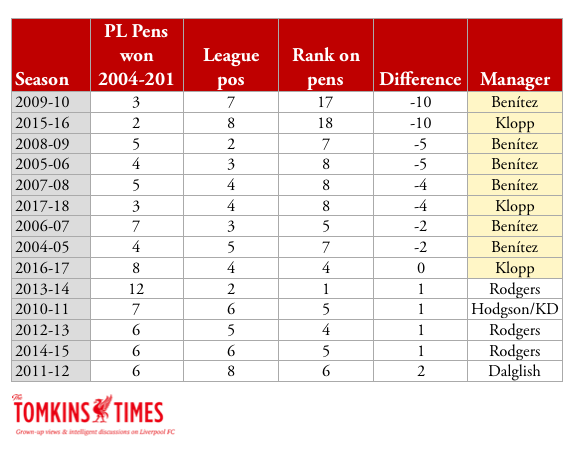
It’s also worth repeating from the other day the fact about the top penalty winners this season, as a club, being Everton, with eight; seven of them by English players (let alone British players). Crystal Palace rank joint second, with six penalties, although one was for a handball. That leaves five penalties, four of which were won by English players. Man City are also joint 2nd, with six penalties, four of which were for fouls on English players (albeit just one player: Raheem Sterling).
Brighton, Leicester and Watford all rank joint 4th, with five penalties apiece. All five of Brighton’s penalties were won by Brits. Four of Leicester’s five were won by Englishmen. Watford are the only odd ones out – out of the top five clubs to win the most Premier League penalties – in that all their penalties were won by overseas players (Richarlison 2, Pereyra 2, Deulofeu).
Otherwise, it’s either all-British or nearly all-British penalty winners; just as, equally remarkably, the only four players to win three or more penalties this season are all British (indeed, all are English).
Last season’s top penalty winners, with ten, were Bournemouth; Scot Ryan Fraser winning half of them; while Spurs, with their English attack, were joint 2nd, with nine. At least Spurs are a good side.
Another Strange Anomaly: The English Referees’ Fear of Giving Penalties in front of the Kop
This has been a suspicion of mine for ages, but here I have more new data (new to me, at least) to back it up. Late last year I looked at how Liverpool get far more penalties in Europe at Anfield than in the Premier League; by a staggering margin of x4 in the past five years.
Now, let’s start by saying that Liverpool, with 92, have won the most penalties of any club in the Premier League since 2002; although Manchester City, despite only being a good side for less than a decade, are just one behind, on 91. So you could argue that Liverpool are doing pretty well on penalties, and ask what am I moaning about. But there’s that huge anomaly in the room.
In my piece earlier this week I look at all the main metrics – possession, shots in the box, touches in the box – and mostly the home team’s advantage would be 55:45. Yet in the Premier League the home team wins two-thirds of all penalties. To me, this suggests that refs don’t award penalties on the balance of play (even in the box), but show a bias towards the home side. While this is a very human failing, it is a failing all the same. It’s a bias.
Using data from the nine current Premier League clubs to have spent most of the past 16 years in the top flight (Man City, Chelsea, Man United, Arsenal, Liverpool, Everton, Spurs, West Ham and Newcastle), there is a statistical quirk that only applies to one team: Liverpool.
If you add Leicester, Southampton, Stoke, Swansea and West Brom to the list, you still get only one single outlier: Liverpool.
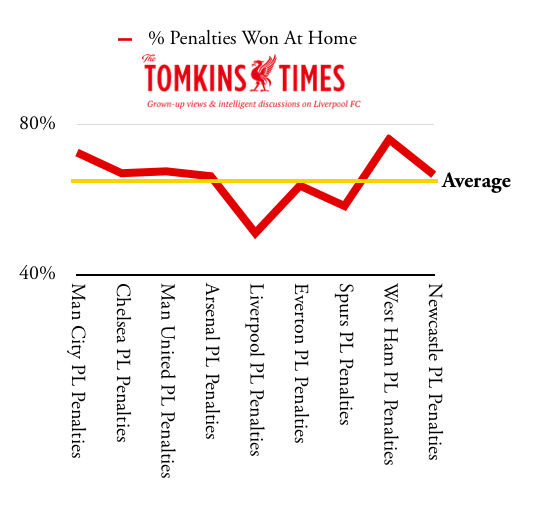
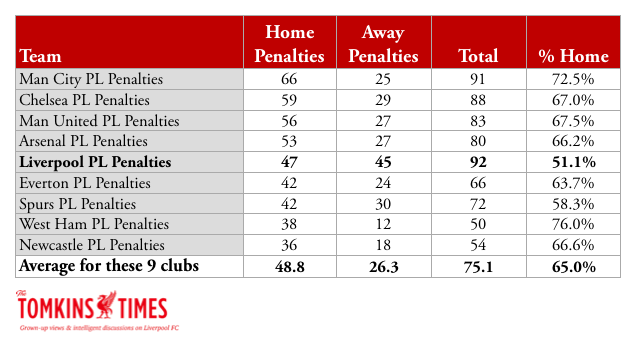
As stated, the Premier League average for penalties is 2:1; two at home for every one won away. That applies to all those clubs over 16 seasons with some minor deviations: Spurs winning 58% at home (a bit below the average), and West Ham and Man City winning over 70% of their penalties at home (a little above the average). To be clear, the average for all nine clubs is 65% of penalties coming at home, and across the entire PL era, for all clubs, it’s 63%.
Except for Liverpool.
For the Reds it’s virtually 50:50; indeed, it’s 51% at home, 49% away.
Now, Liverpool have won by far the most away PL penalties in the past 16 years, which I can’t necessarily explain; but it’s not like there can be an obvious bias here, as refs almost always favour the home team on penalties, as shown … except at Anfield.
Liverpool have been a very good away team in some seasons during in this time, but also had plenty of dominant seasons at home.
Even more alarming is the fact that, over the past eight seasons, Liverpool are down to 46% of their league penalties being awarded at Anfield. Which smacks of refs bending over backwards to show they don’t appease the Kop.
Even when Luis Suarez won three penalties for being fouled in the box and two for prompting handballs in 2013/14, only one was at Anfield; indeed, nine of the twelve penalties that season were away. It’s now a full-blown trend.
Now, I only know of only two clubs that are famous, or infamous (rightly or mythically), for their crowds winning penalties: Liverpool and Manchester United. Perhaps the Kop used to make referee’s buckle in the old terraced days, and I still hear British managers talk about “not getting a decision at Anfield”, perpetuating the myth. But Anfield is hardly a bear-pit these days, bar the big games. (None of the big clubs regularly have those kinds of atmospheres, as too many of the games feel like they should be won anyway; only really buzzing when it’s a big encounter.)
Since 2002, United have won over twice as many penalties at home as away (56 to 27), in keeping with the normal pattern. So there’s no bending over backwards by refs to prove strength at Old Trafford. And for the last eight seasons they have continued to win twice as many penalties at home as they do away: 66% at Old Trafford, compared to Liverpool’s 46% at Anfield since 2010.
Seriously, this makes little sense, other than bias by referees.
We saw in Liverpool’s FA Cup game against West Brom that the referee on the pitch didn’t want to give Liverpool a penalty, or any of the big decisions, but the VAR did. The VAR then gave everything Liverpool’s way, because he got things right – as the neutrals acknowledged – after the ref had got them wrong. (VAR just spoilt the game with the time it took.)
That one game brought my two overarching themes together: foreign players don’t win as many penalties as they should, and Liverpool do not win as many penalties at Anfield as they should. It was the only Anfield penalty won by Mo Salah this season, despite several clear-cut cases.
And even then, the referee in the ground didn’t “feel” it.
Liverpool – despite being a potent, quicksilver attacking force – have won just a single league penalty at Anfield this season. Yes, the Reds are slightly more prolific on the road, but the difference is marginal at 35 goals to 33. Equally, the Reds haven’t lost a home game, and have won more at Anfield than on the road (and have a goal difference more than twice as good as their away GD). So, Liverpool are still better at home than away, but don’t get the penalties to go with it.
Home penalties for Liverpool in the league are rare; indeed, Spurs have won two at Anfield and Everton one this season, three times as many as the Reds, as the home team, have in 15 games.
Now, you can call this paranoia and bias, but why are Liverpool the only Premier League team to get such a tiny percentage of their penalties at home (in relation to the average) over a big, 16-season sample size? If penalties are totally random, why do all the other clubs get two-thirds at home and one third away?
And why do Brits, who comprise just 41% of the players, win almost 60% of the penalties?
Why does Liverpool’s penalty count go up when the team is more British and down when the team is more foreign – even though, in that time (since 2004 at least), there has been one outstanding British attacking player (Steven Gerrard) and a couple of excellent ones (Daniel Sturridge and Raheem Sterling, both briefly), whereas in the same period there has been Fernando Torres, Luis Suarez, Mo Salah, Roberto Firmino, Philippe Coutinho and Sadio Mané?
Is the fact that most of Liverpool’s attackers foreign causing the Reds to lose up to a handful of legitimate penalties a season due to refereeing bias, which could be worth a significant number of points?
The other day I looked at dribbling in relation to penalties, and dribblers do indeed seem to win a lot of spot-kicks. Except Liverpool’s, even though the Reds have arguably the most exciting front three in the league, and up there with the best in Europe; and two of the fastest widemen in world football. Running off the ball – into the area – is another way to win penalties. But Liverpool do that too.
Since the first game of the season, Adam Lallana has barely played, yet he’s won as many domestic penalties in that time as Mo Salah; and if we only look at penalties that weren’t given by the VAR, it’s Lallana 1, Salah 0. It’s also Lallana 1, Salah and Mané combined 0. As I did the other day, you can list almost all of the Premier League’s best overseas attacking talents and they still don’t have as many penalties combined as Dominic Calvert-Lewin or Glenn Murray.
In the last eight seasons Liverpool have never won more than four home league penalties in any single campaign. Dominic Calvert-Lewin has four already this season, and the season isn’t finished. A poor Everton side have already won five penalties at Goodison Park this season, as have relegation-threatened Crystal Palace at Selhurst Park; more than Liverpool have at home (in a season) in the past eleven years.
How?